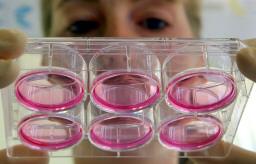Italian and United States researchers have discovered a mutated form of beta-protein that can prevent the development of Alzheimer's disease, the most common form of dementia.
Scientists at the Besta Institute, the Mario Negri Institute in Milan and the Nathan Kline Institute of Orangeburg have identified that a mutated form of beta-protein is able to block the production of the extracellular deposits in the brain, known as amyloid plaques, thought to cause Alzheimer's.
''The research has identified a mutated form of beta-protein which has a surprising behaviour: it joins itself to normal beta-protein and blocks the formation of amyloid, and consequently the development of Alzheimer's,'' said Fabrizio Tagliavini, director of the Besta Institute's neurodegenerative disease department.
So far the scientists have only seen the beta-protein at work in test tubes but they are now working on testing it on animals.
A team at the Mario Negri Institute is testing the method on C. Elegans, a nematode worm smaller than an eyelash, around 40% of whose genes have human counterparts, while the US team will begin testing on mice.
''It will take a long time (to see the effects in mammals) because we need to observe them for over a year,'' Tagliavini said.
''If everything goes as planned, it will take at least five years before we have a drug. But this is a promising beginning for a disease that currently has no cure,'' he said of the research, which has been published in Science.
Alzheimer's currently affects 450,000 people in Italy and six million in Europe but is set to double by 2050 as the number of elderly grows.




